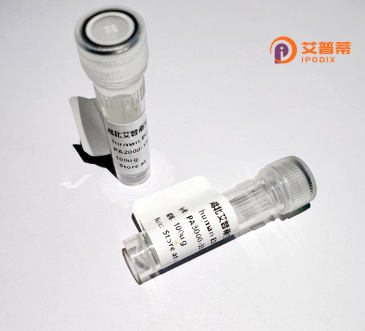
| 纯度 | >90%SDS-PAGE. |
| 种属 | Human |
| 靶点 | BTG2 |
| Uniprot No | P78543 |
| 内毒素 | < 0.01EU/μg |
| 表达宿主 | E.coli |
| 表达区间 | 1-158aa |
| 氨基酸序列 | MSHGKGTDML PEIAAAVGFL SSLLRTRGCV SEQRLKVFSG ALQEALTEHY KHHWFPEKPS KGSGYRCIRI NHKMDPIISR VASQIGLSQP QLHQLLPSEL TLWVDPYEVS YRIGEDGSIC VLYEEAPLAA SCGLLTCKNQ VLLGRSSPSK NYVMAVSS |
| 分子量 | 17.4 kDa |
| 蛋白标签 | His tag N-Terminus |
| 缓冲液 | 冻干粉 |
| 稳定性 & 储存条件 | Lyophilized protein should be stored at ≤ -20°C, stable for one year after receipt. Reconstituted protein solution can be stored at 2-8°C for 2-7 days. Aliquots of reconstituted samples are stable at ≤ -20°C for 3 months. |
| 复溶 | Always centrifuge tubes before opening.Do not mix by vortex or pipetting. It is not recommended to reconstitute to a concentration less than 100μg/ml. Dissolve the lyophilized protein in distilled water. Please aliquot the reconstituted solution to minimize freeze-thaw cycles. |
以下是关于重组人蛋白BTG2(BTG2)的3篇代表性文献及其摘要内容:
1. **文献名称**:*"BTG2. a novel p53-induced gene, negatively regulates cell cycle progression and promotes apoptosis"*
**作者**:Rouault et al.
**摘要**:研究首次发现BTG2是p53的靶基因,通过调控细胞周期(如抑制G1/S转换)和诱导凋亡参与肿瘤抑制。实验表明BTG2过表达可抑制细胞增殖,提示其作为抑癌基因的功能。
2. **文献名称**:*"Epigenetic silencing of BTG2 through DNA hypermethylation and miR-21-mediated repression in breast cancer"*
**作者**:Li et al.
**摘要**:分析了BTG2在乳腺癌中的表达缺失机制,发现启动子区高甲基化和miR-21过表达共同导致其沉默。恢复BTG2表达可抑制肿瘤细胞生长和侵袭,揭示了其作为治疗靶点的潜力。
3. **文献名称**:*"BTG2 suppresses cancer metastasis by inhibiting epithelial-mesenchymal transition in colorectal cancer"*
**作者**:Zhang et al.
**摘要**:研究证实BTG2通过抑制上皮-间充质转化(EMT)抑制结直肠癌转移,机制涉及调控Slug和E-cadherin等分子。BTG2低表达与患者不良预后相关,提示其临床诊断价值。
这些文献涵盖了BTG2的调控机制、肿瘤抑制功能及其在特定癌症中的作用,均为领域内高影响力研究。
**Background of Recombinant Human Protein BTG2 (BTG2)**
BTG2 (B-cell translocation gene 2 protein), a member of the BTG/Tob family, is an anti-proliferative and tumor-suppressive protein encoded by the *BTG2* gene. First identified as a p53-inducible gene, it plays critical roles in regulating cellular processes such as cell cycle arrest, apoptosis, and differentiation. BTG2 interacts with various signaling pathways, including the PI3K/AKT, Wnt/β-catenin, and NF-κB pathways, to modulate cell proliferation and stress responses. It also acts as a transcriptional co-regulator, influencing chromatin remodeling and RNA metabolism by binding to arginine methyltransferases (e.g., PRMT1) and mRNA decay factors.
Dysregulation of BTG2 has been implicated in multiple cancers, including breast, lung, and colorectal carcinomas, where reduced expression correlates with tumor progression and poor prognosis. Its activity is tightly controlled through post-translational modifications (e.g., phosphorylation) and interactions with proteins like Caf1 (CCR4-NOT complex), which stabilize its function in mRNA degradation.
Recombinant human BTG2. produced via bacterial (e.g., *E. coli*) or mammalian expression systems, retains native biological activity. It is widely utilized in *in vitro* studies to dissect its molecular mechanisms, screen for therapeutic agents, and explore its potential in tissue regeneration and cancer therapy. Current research also focuses on its role in inflammation, stem cell biology, and response to DNA damage, highlighting its versatility as a therapeutic target.
×